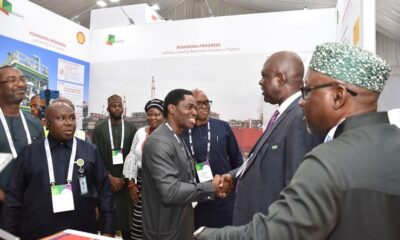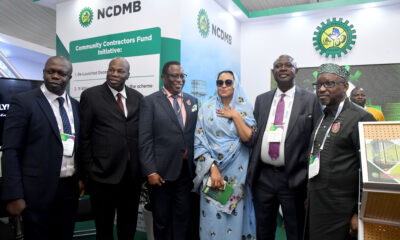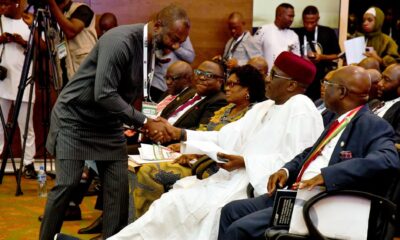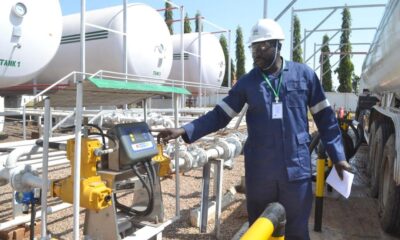Business
Minister Hails NCDMB, Nedogas Strategic Partnership
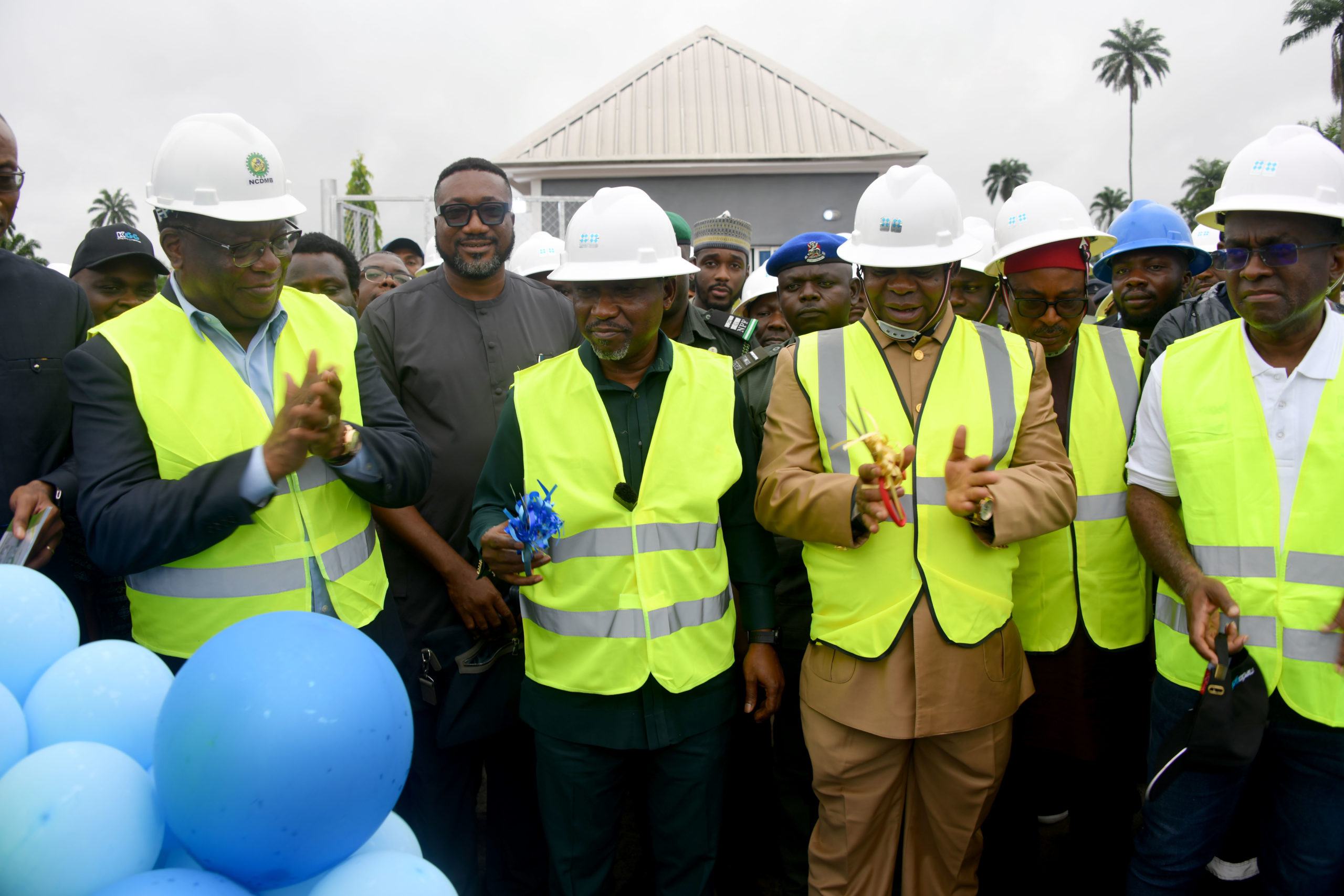
The Honorable Minister of State for Petroleum Resources (Gas), Rt. Hon. Ekperikpe Ekpo, has commended the Nigerian Content Development and Monitoring Board (NCDMB) and Nedogas Development Company Limited for initiating and successfully executing the 300 million standard cubic feet (MMscf) Kwale Gas Gathering (KGG) Facility and Nedogas Plant in Umusam community, Delta State.
He gave the commendation at the formal commissioning of the two projects on Thursday.
The Minister said the outcome of the strategic collaboration between the two companies represents “a significant advancement in the country’s efforts to promote sustainability, energy efficiency, and economic expansion.”
According to him, “The NCDMB and Nedogas Limited, of which Xenergy Limited is a part, deserve praise for their tireless work and steadfast dedication to this admirable cause,” and that the collaboration “serves as evidence of the effectiveness of our local content policy, which seeks to increase the involvement of Nigerian businesses in the oil and gas industry while promoting local knowledge and capability.”
He said the country’s capacity to extract and use natural gas resources has been significantly boosted with the completion of Nedogas Plant, which will increase domestic supply and export potential, while generating jobs, “fostering industrial expansion, and ensuring energy security.”
The Kwale Gas Gathering Facility, he pointed out, solves a persistent environmental issue as it captures associated gas that would otherwise be vented and thus turn a potentially waste product into a useful resource. The ‘Decade of Gas’ plan of the Federal Government, he observed, is being promoted in the two projects of Nedogas.
In concluding, he enjoined all to note that “It is essential that we keep enhancing the collaborations amongst all parties involved as we progress,” while assuring that “The Ministry of Petroleum Resources (Gas) is still dedicated to helping programs that improve local content, promote investments, develop capacity, and give Nigerians opportunity.”
On his part, the Executive Secretary, NCDMB, Engr. Felix Omatsola Ogbe, remarked that the achievement recorded by the Board and Nedogas represents “a triumph of partnership and shared vision” and “confirms that the Government, the private sector and local communities can collaborate effectively to bring value to the economy.”
He assured that “NCDMB remains committed to fostering such collaborations and creating an enabling environment for investments” and that the Board is equally proud of strategic projects it is developing in partnership with other chain investors in the last 10 years. These, he noted, “are geared towards actualising Federal Government’s policy direction.”
According to the ES, the KGG Facility and Nedogas Plant are not only infrastructural achievements but also serve as catalysts for local content development and job creation, among other things.
“Looking ahead,” he reaffirmed, “NCDMB will continue to support similar initiatives that promote local content, drive economic growth, and improve the quality of life of Nigerians.”
Governor, Delta State, Rt. Hon. Sheriff Francis Oborevwori, represented by his Deputy, Chief Monday John Onyeme, expressed happiness that his State is playing host to such an important project which would address the energy needs of Nigerians.
He said the economic importance of the KGG Facility and Nedogas Plant would be best appreciated if placed within the context of the energy crisis in the country.
Citing World Bank statistics, he stated that power supply is so poor that companies spend as much as $29 billion yearly to remain in business, and that “the country is ranked as the lowest in terms of access to electricity globally.”
For his part, the Commission Chief Executive (CCE), Nigerian Upstream Petroleum Regulatory Commission (NUPRC), Engr. Gbenga Komolafe, said the inauguration of the cutting-edge Facility and Plant represents a pivotal milestone for NCDMB and Nedogas.
According to the CCE, represented by Chief Ogunnubi Olusegun, Regional Coordinator of the Commission, “By pushing the boundaries of energy production capacity, you are setting a commendable standard for others to aspire to.”
In his Welcome Address, the Chairman of Nedogas, Emeka C. Ene, expressed appreciation to partners in the two projects that had contributed to the success being celebrated at the commissioning ceremony.
He was particularly impressed with NCDMB’s strategic capacity development initiatives under successive Managements, from Engr. Simbi Wabote to Engr. Felix Omatsola Ogbe.
He said the KGG Facility and Nedogas Plant “align perfectly with the ‘Decade of Gas’ initiative which the Federal Government has continued to promote, noting that the location of the KGG hub, being close to the Delta State Industrial Park, would significantly enhance economic activities and development of the State.
The location, he explained, is also strategic as the Facility would serve as a home, a collection point, to gas from different operating fields.
According to him, “All the stranded gas in the area is to be harnessed for the benefit of the people.”
On the wider significance of the KGG Facility, he noted that “This is a modular plant; it can be replicated 10 times over,” and that similar facilities need to be developed to deal with the 140 flare sites in the oil-producing areas.
Key Project Drivers, as the company explains in its official brochure, are Stranded Gas, Proximity to Market, Evacuation Pipeline, Gas Development and Socio-economic Benefits. In regard to the first above the company states, “Natural gas stranded in OML [oil mining lease] 56 (Kwale area) due to absence of evacuation pipeline,” while noting under Gas Development that “A unique gas development opportunity exists for cluster members using shared facilities to leverage on gas network.”
Business
Savannah Energy Provides Unaudited FY 2024 Trading Updates

Savannah Energy has shared a trading update on its Nigerian operations and other markets in Africa, including up-to-date cash collections in its Nigerian business.
According to the update, made available on Thursday in Lagos, its gross production in Nigeria averaged 23.1 Kboepd for FY 2024, broadly in line with the prior year’s 23.6 Kboepd, of which 88% was gas (FY 2023: 91%).
On the update, CEO of Savannah Energy, Andrew Knott, said, “I am pleased to provide a FY trading update which demonstrates the continued progress we have made in 2024, a year which saw the highest level of cash collections ever recorded by our Nigerian business. 2025 is expected to be an exciting year for our Company: we have a large planned operational programme in Nigeria which is anticipated to enhance both our oil and gas production levels and capacity; we intend to progress our R3 East oil development project in Niger; we continue to pursue key acquisitions in the upstream oil and gas space; and we continue to seek to build our power business.
“Fundamentally, Savannah remains unequivocally an “AND” company, seeking to deliver strong performance both for the short AND long term across multiple fronts, and pursuing growth opportunities in both the hydrocarbon AND power sectors.”
The update It also shows that it generated a Total Income of US$393.6 million in 2024, compared to FY 2023’s US$289.8 million. This consists of Total Revenues of US$258.7 million and Other operating income of US$134.9 million.
The report also shows that Savannah’s FY 2024 Total Revenues were ahead of the previously issued financial guidance of greater than US$245 million, while FY 2024 financial guidance is reiterated for Operating expenses plus administrative expenses at ‘up to US$75 million’. The company expects its FY 2024 capital expenditure to come in lower than planned (previously guided at ‘up to US$50 million’) due to the phasing of spend.
ALSO READ: CSR: Dangote Awards Scholarships To 473 Students
According to the update, Savannah’s cash collections in 2024 amounted to US$248.5 million, a slight increase from the US$206 million it received in 2023. The report further shows that its cash balances as at 31 December 2024 stood at US$32.6 million, compared to the 31 December 2023 figure of US$107.0 million.
The report shows that the company’s midstream subsidiary, Accugas Limited, had as at 31 December 2024 drawn down on its NGN332 billion of the NGN Transitional Facility, with the resulting funds being converted to US$, which, along with cash held, was used to partially prepay the existing Accugas US$ Facility, leaving a balance as at 31 December 2024 of approximately US$212.3 million.
The report also provided new updates on Accugas’ US$45 million Uquo Central Processing Facility (“Uquo CPF”) compression project in Nigeria, noting that its commissioning which will enable the expansion of gas production in the medium term is well underway.
The report highlighted the progress being made in the procurement process of long lead equipment in Nigeria for a potential two-well drilling campaign on the Uquo Field in H2 2025, with an additional gas development well expected to add up to 80 MMscfpd of supplemental production capacity and a potential exploration well targeting an Unrisked Gross gas initially in place (“GIIP”) of 154 Bscf (25.7 MMboe) of incremental gas resources.
The update shows that progress is also being made in the planned Savannah acquisition of Sinopec International Petroleum Exploration and Production Company Nigeria Limited, whose principal asset is a 49% non-operated interest in the Stubb Creek oil and gas field (“Stubb Creek”), with regulatory approval and completion being targeted in Q1 2025. Following the completion of the acquisition, Savannah intends to commence an expansion programme which is anticipated to increase Stubb Creek gross production from an average of 2.7 Kbopd in 2024 to approximately 4.7 Kbopd.
In Niger, Savannah continues to seek to progress its 35 MMstb (Gross 2C Resources) R3 East oil development in South-East Niger, while it continues to push for a potential alternative transaction structure to acquire a material stake in producing oil and gas assets in South Sudan as previously announced on 20 December 2024.
On the renewable energy front, the update shows that Savannah has up to 696 MW of renewable energy projects currently in motion, including the up to 250 MW Parc Eolien de la Tarka wind farm project in Niger and the up to 95 MW Bini a Warak hybrid hydroelectric and solar project in Cameroon. A firm believer in Africa’s transition to renewable energy, Savannah continues to target a portfolio of up to 2 GW+ of power projects in motion by the end of 2026.
Business
Nigeria Can Achieve 5.5% GDP Growth – NESG
The Nigerian Economic Summit Group (NESG) has projected that the country has the potential to achieve a 5.5% growth in Gross Domestic Product (GDP) if critical policy reforms are sustained.
This was disclosed on Thursday during the launch of the NESG’s 2025 Macroeconomic Outlook report.
Speaking at the event, the Chief Economist and Director of Research & Development at NESG, Dr. Olusegun Omisakin, highlighted the need for more efficient policy implementation to unlock Nigeria’s economic potential.
READ MORE: Davido Is Richer Than His Billionaire Father – Ibrahim Chatta Claims
“We believe at the optimal level, if we embark on more efficient policy reforms, the Nigerian economy has the potential, the GDP to end up at 5.5 per cent, and we believe that this is achievable,” Omisakin stated.
More to follow……….
Business
CBN Approves Release Of Nigerian FX Code
The Central Bank of Nigeria (CBN) has announced the release of the Nigerian Foreign Exchange (FX) Code, a set of guidelines designed to promote ethical conduct among authorized dealers in the country’s FX market.
In a statement, the apex bank disclosed that the official launch of the Code would take place on Tuesday, January 28, 2025, at the CBN Head Office Auditorium in Abuja.
READ MORE: Dangote Denies Culpability In Pumping Up Petrol Price
“The Central Bank of Nigeria has approved the release of the Nigerian Foreign Exchange (FX) Code as a guideline to the banking industry to promote the ethical conduct of authorised dealers in the Nigerian Foreign Exchange Market,” the statement read.
The introduction of the FX Code is expected to enhance transparency, accountability, and professionalism within Nigeria’s foreign exchange ecosystem, aligning it with global best practices.
The event is anticipated to attract key stakeholders in the financial and banking sectors, as well as representatives from authorized FX-dealing institutions across the country.

